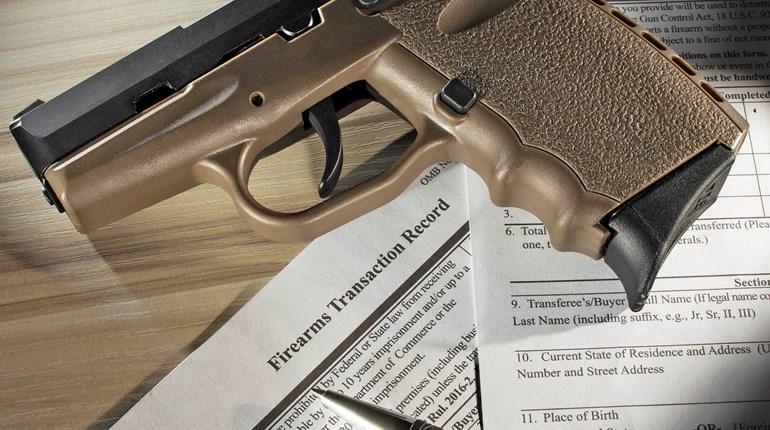
It is outrageous that there is not more public outcry about the New York state government’s attempt to destroy a 150-plus-year-old civil-rights association— yes, our National Rifle Association.
“Destroy” is not hyperbole.
While he was governor of New York, Democrat Andrew Cuomo made his intentions clear when he tweeted on Aug. 3, 2018: “The regulations NY put in place are working. We’re forcing the NRA into financial jeopardy. We won’t stop until we shut them down.”
What preceded that vow was a campaign meant to silence the NRA forever.
At the behest of Gov. Cuomo, the then-superintendent of the New York State Department of Financial Services (DFS), Maria Vullo, took aim at the NRA and agreed to use the DFS’ regulatory power to financially blacklist the NRA to thereby coerce banks and insurers to cut ties with the NRA in order to suppress this association’s pro-Second Amendment speech.
The NRA argues that Vullo’s actions were meant to silence the NRA by using “guidance letters” and other measures to cause financial institutions to “drop” the NRA.
Vullo targeted the NRA when she wrote that the “DFS urges all insurance companies and banks doing business in New York to join the companies that have already discontinued their arrangements with the NRA.” A press release also said DFS would “urge” the companies it regulates “to review any relationships they may have with the National Rifle Association” for “reputational risk.”
The NRA filed a lawsuit in 2018 to defend its members and the freedoms in which they believe.
In a commentary titled “New York State Can’t Be Allowed to Stifle the NRA’s Political Speech,” the ACLU’s legal director, David Cole, wrote, “If the NRA’s charges are true, the state’s actions would clearly violate the First Amendment. Public officials are, of course, free to criticize groups with which they disagree. But they cannot use their regulatory authority to penalize advocacy groups by threatening companies that do business with those groups. And here the state has admitted, in its own words,at that it focused on the NRA and other groups not because of any illegal conduct, but because they engage in ‘gun promotion’—in other words, because they advocate a lawful activity.”
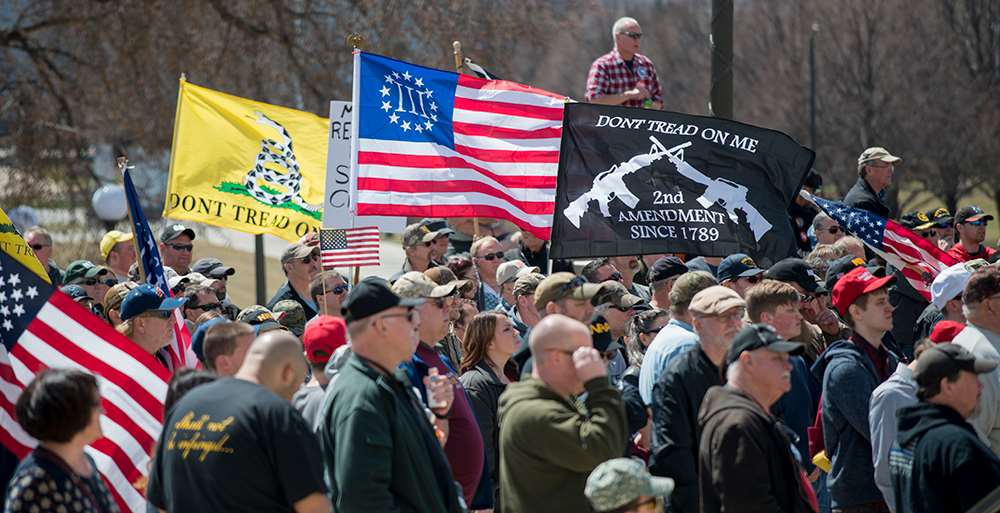
The NRA’s First Amendment claims withstood multiple motions to dismiss. But in 2022, after Vullo appealed the trial court’s ruling, the Second Circuit struck down the NRA’s claims. The court ruled that in an era of “enhanced corporate social responsibility,” it was reasonable for New York’s financial regulator to warn banks and insurance companies against servicing pro-gun groups based on the “social backlash” against those groups’ advocacy.
The court also ruled that Vullo’s guidance was not a directive to the institutions she regulated but rather a mere expression of her political preferences.
In February 2023, the NRA filed a petition for a writ of certiorari with the U.S. Supreme Court, seeking review of the controversial judgment. The matter in question quickly became one of the nation’s most high-profile First Amendment cases.
As this was being written, the NRA awaits a decision as to whether the Supreme Court will hear the case.
“Public officials are, of course, free to criticize groups with which they disagree. But they cannot use their regulatory authority to penalize advocacy groups by threatening companies that do business with those groups.” —ACLU
Dozens of organizations across the political spectrum joined the NRA in calling for this matter to come under further judicial scrutiny. Seven amicus briefs (friend of the court briefs) representing nearly 40 individuals and organizations have been filed in support of the NRA.
An amicus brief from 18 state attorneys general concluded that the Second Circuit misapplied the law by “finding that Vullo’s remarks weren’t threatening because they ‘were written in an evenhanded, non-threatening tone,’ ‘employed words intended to persuade rather than intimidate’ and ‘did not refer to any pending investigations or possible regulatory action’ … conflicts with this Court’s decision in Bantam Books and splits from the Second Circuit’s prior precedent and with the precedent of the Third, Fourth, Seventh, Eighth, Ninth and D.C. Circuits.”
The AGs also said, “The Second Circuit’s decision gives government officials license to financially cripple their political opponents, or otherwise stifle their protected speech, whether those rivals advocate for school choice, abortion rights, religious liberty, environmental protections, or any other politically salient issue. [The Supreme Court] should grant the petition and reverse.”
In sum, the state attorneys general noted that the Second Circuit broke with established First Amendment precedent to rule against the NRA.
The free speech advocacy organization, The Foundation for Individual Rights and Expression (FIRE), was equally direct.
Its brief says, “Given its decades of experience defending freedom of expression, FIRE is keenly aware that public officials too often misuse their power through threats and other informal mechanisms of coercion to stifle controversial speakers and impose ideological conformity. FIRE submits this brief to urge this Court to reverse the alarming decision of the Second Circuit, which held that petitioner had failed to state a viable claim despite detailed allegations that a powerful New York state official threatened action against regulated entities that associated with petitioner because she opposed petitioner’s political advocacy.”
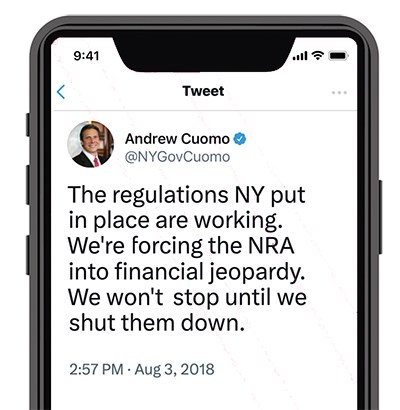 In another example, Goldwater Institute staff attorney John Thorpe wrote in a column: “The Goldwater Institute filed an amicus brief in support of the NRA, asking the Supreme Court to step in and declare that government officials can’t punish individuals or groups for their free speech by bullying others into cutting ties with them. In its brief, Goldwater pointed out that millions of Americans are subject to the same kind of ‘informal censorship’ that happened here. That’s because they, like the NRA’s former business partners, live and work under complex regulatory regimes where bureaucrats can easily use investigations, licensing decisions, and other forms of red tape as weapons against those whose beliefs and ideologies they disapprove of.”
In another example, Goldwater Institute staff attorney John Thorpe wrote in a column: “The Goldwater Institute filed an amicus brief in support of the NRA, asking the Supreme Court to step in and declare that government officials can’t punish individuals or groups for their free speech by bullying others into cutting ties with them. In its brief, Goldwater pointed out that millions of Americans are subject to the same kind of ‘informal censorship’ that happened here. That’s because they, like the NRA’s former business partners, live and work under complex regulatory regimes where bureaucrats can easily use investigations, licensing decisions, and other forms of red tape as weapons against those whose beliefs and ideologies they disapprove of.”
The weaponization of government against political adversaries is not supposed to be an American problem, but, as this case shows, it has become one. The First Amendment rights of millions of NRA members are imperiled by government officials, so that public dissent to these officials’ gun-control schemes might be diminished.
When a government power-grab such as this is attempted, the courts are supposed to stand up for the individual’s right to speak, to form associations like the NRA and to advocate for all of their constitutionally enumerated freedoms. Those are bedrock principles.
By seeking to destroy this association, gun-control advocates are trying to reduce your ability to speak and to peacefully advocate for your constitutional rights.
The Epicenter of the Clash: New York
Tellingly, this attack on the NRA’s First Amendment rights is part of a larger anti-freedom campaign.
As a candidate for New York attorney general in 2018, Letitia James (who, at the time, was New York City Public Advocate) pledged, if elected, to investigate the NRA, which she referred to as an “organ of deadly propaganda masquerading as a charity for public good.”
In an amazing bit of candor, James admitted that because the “NRA has an office here in New York State,” she would “investigate to see whether or not they have in fact complied with the not-for-profit law in the state of New York.” She called the NRA a “terrorist organization” and a “criminal enterprise.”
Therefore, it was no surprise when, after taking office, Attorney General James announced her much-promised investigation into the NRA. She filed a “dissolution lawsuit”—seeking to shut down the NRA forever—in August 2020.

At the time, then-NRA President Carolyn Meadows said, “This was a baseless, premeditated attack on our organization and the Second Amendment freedoms it fights to defend. You could have set your watch by it: the investigation was going to reach its crescendo as we move into the 2020 election cycle. It’s a transparent attempt to score political points and attack the leading voice in opposition to the leftist agenda. This has been a power grab by a political opportunist, a desperate move that is part of a rank political vendetta. Our members won’t be intimidated or bullied in their defense of political and constitutional freedom.”
“This has been a power grab by a political opportunist ... . Our members won’t be intimidated or bullied in their defense of political and constitutional freedom.”
–Former NRA President Carolyn Meadows
There was an immediate public backlash to the New York attorney general’s draconian pursuit of the NRA.
The ACLU commented in The Wall Street Journal that the “NRA isn’t popular with New York’s politicians. Ms. James has called it a ‘terrorist organization.’ Gov. Andrew Cuomo had his chief financial regulator urge New York banks and insurers to reconsider doing business with the NRA and other ‘gun- promotion’ groups, and proclaimed in a campaign mailer that ‘If the NRA goes bankrupt, I will remember them in my thoughts and prayers.’”
The ACLU also wrote, “You may have your own opinions about the NRA, but all Americans should be concerned about this sort of overreach. If the New York attorney general can do this to the NRA, why couldn’t the attorney general of a red state take similar action against the ACLU, the AFL-CIO, Common Cause, or Everytown for Gun Safety?”
The ACLU observed that America’s democracy is premised on the right of association.
The NRA is winning this critical constitutional battle with Attorney General James. On March 2, 2022, a New York court struck down attempts by the NY attorney general to dissolve the organization. Following a two-hour hearing on Dec. 10, 2021, the Hon. Joel M. Cohen of the New York State Supreme Court issued an opinion vindicating the NRA’s position. The NY attorney general’s effort to shut down the Association ran afoul of common sense, New York law and the First Amendment.
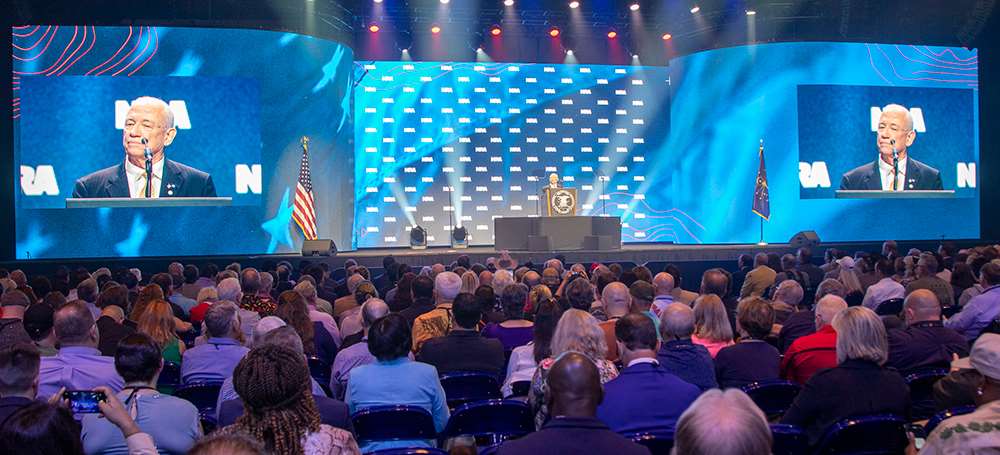
NRA President Charles Cotton said, “This is a resounding win for the NRA, its five million members and all who believe in this organization. The message is loud and clear: the NRA is strong and secure in its mission to protect constitutional freedom.”
The New York Sun called the NRA win a “much-needed victory for the NRA.” The publication’s editorial board wrote of the decision: “We welcome it because it calls out the abuse of power that has marked New York’s campaign against the NRA not only by Ms. James, but also by Gov. Cuomo.”
The NRA will defend against the surviving claims in the lawsuit, but the court’s ruling declares that the NY attorney general cannot shut down the NRA or seize its assets.
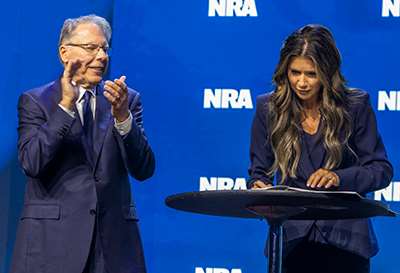
All Roads Lead to the Constitution
The text of the First Amendment to the U.S. Constitution reads: “Congress shall make no law respecting an establishment of religion, or prohibiting the free exercise thereof; or abridging the freedom of speech, or of the press; or the right of the people peaceably to assemble, and to petition the Government for a redress of grievances.”
Various courts have interpreted the “free exercise” of speech to include our right to freely associate amongst ourselves. Anything less would take away our right to speak freely.
Although the Second Circuit doesn’t think the NRA’s First Amendment rights were trampled on, the Supreme Court, in contrast, has long been a devout protector of the First Amendment. Indeed, precedents such as Bantam Books v. Sullivan (1963) hinged upon far-less egregious infringements than what New York has clearly committed in this attack on the NRA’s First Amendment rights.
Without the First Amendment right to advocate for our freedom, the NRA and so many other associations could be silenced, disenfranchised, canceled and demonetized by government authorities from either side of the political spectrum.
If left intact, the Second Circuit decision would empower governments to financially dissect individuals, associations and corporations that they might find to be political adversaries.
Preserving Freedom
People often forget that the First and Second Amendments to the U.S. Constitution were supposed to be the Third and Fourth, but the legislators in the states that ratified 10 of the 12 amendments of the original U.S. Bill of Rights decided to make a change. They declined to ratify the first two and so adopted freedom of religion, speech and assembly to be the First and let these protections be followed by the Second’s right to keep and bear arms.
The two discarded amendments were not ratified with the others, as a few state legislatures opted not to do so. What was to be the First is known as “the Representation Amendment.” What would have been the Second is often referred to as “the Congressional Pay Amendment,” which eventually became our 27th Amendment.
By doing this, the earliest Americans seemed to know intuitively that the First Amendment must be the verbal defender of all the others and that an armed populace is necessary to keep the rest.
Your NRA will continue to defend those freedoms, the promises they hold for future generations and the spirit of America.















